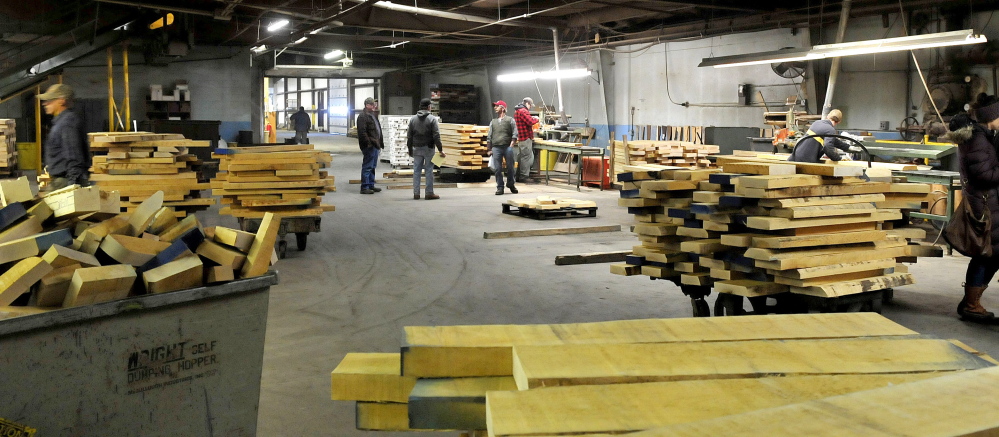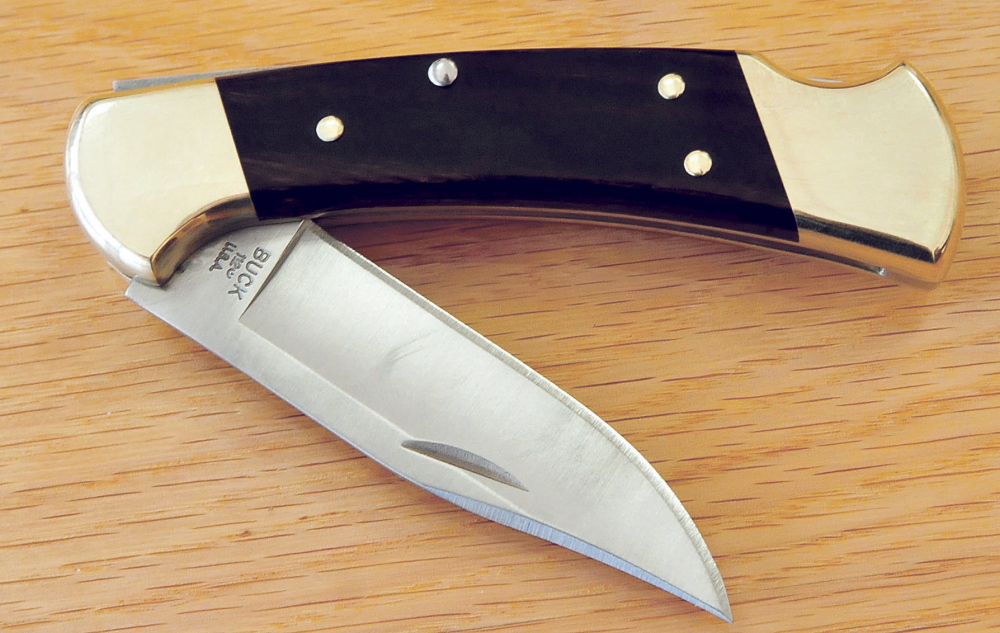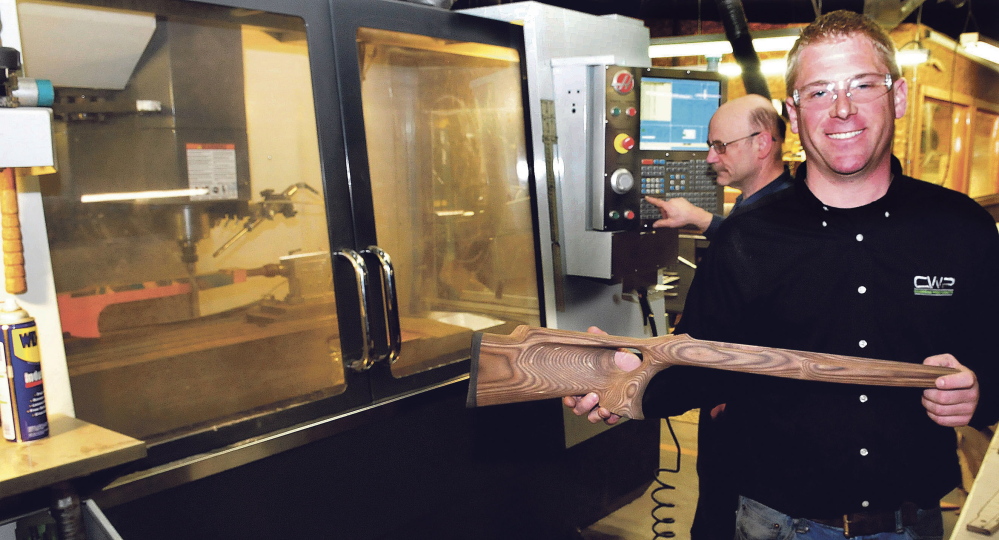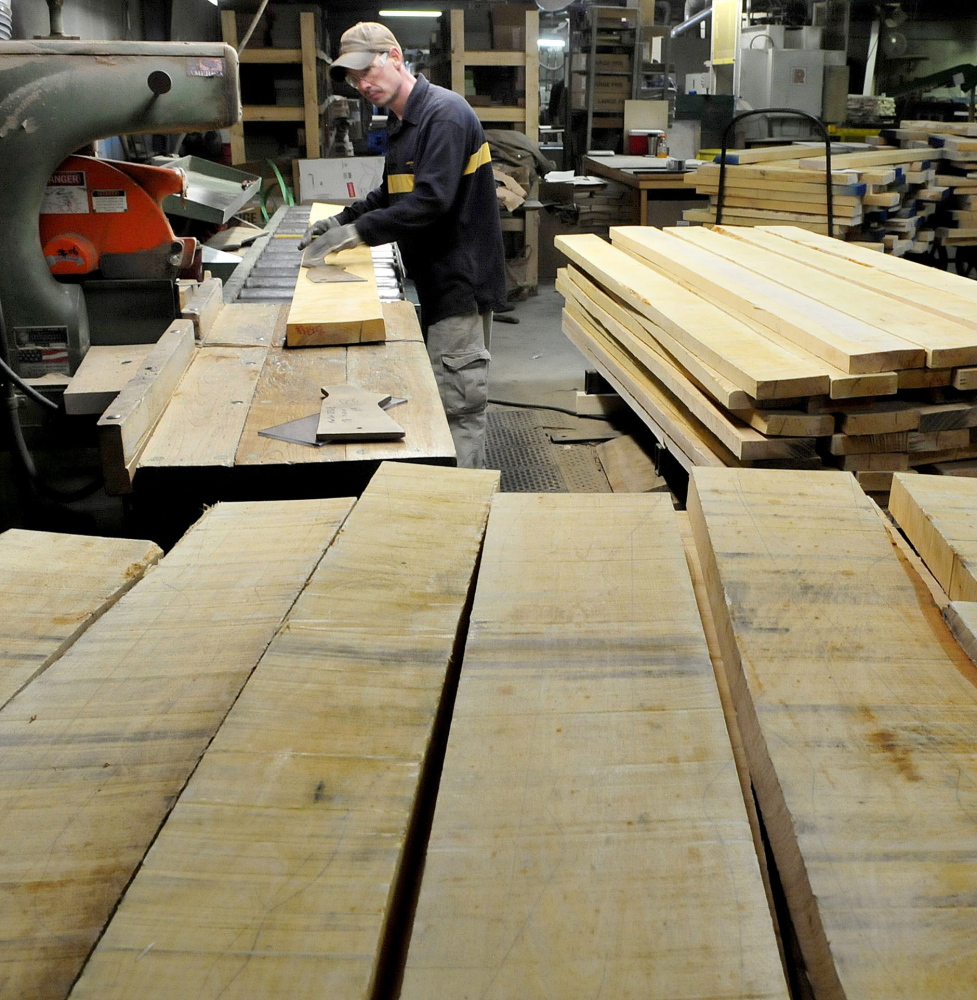NORTH ANSON — From the outside, the snow-covered lumber yard and dilapidated warehouse at Cousineau Wood Products show little signs of the productivity going on inside.
Machines are running around the clock, seven days a week; and thousands of gun parts and other wood products are being shipped around the country on a daily basis. The number of employees has more than doubled in the last year — from about 20 workers to 55 — and there are plans to add 10 to 15 more jobs by the end of the year.
“We have more orders than we can fill,” said Cousineau Wood Products Vice President Brody Cousineau, from a brand new sun-filled office. The company is part of Cousineau Forest Products in East Wilton and is owned by Cousineau; his father, Randy; and his sister, Brandi.
The story of the Cousineaus’ success is part luck — a competing manufacturer of wooden gun parts in Vermont was recently shut down by a fire — but also perseverance. The North Anson business first opened in 2001 as a sawmill that turned lumber into kiln-dried wood for cabinetry and furniture. The company made gunstocks, too, the wooden body of the gun that holds the barrel; but it was just a small percentage of the business, with a few hundred being made per week.
During the housing market crash of 2008, demand for furniture and lumber dropped, and the Cousineaus shut down the sawmill. They started putting their energy into making gunstocks — buying their own press and dying veneers, sheets of wood that are dyed and glued together to make sturdier stocks.
Today the company makes more than 13,000 gunstocks a week. It also has expanded its product line to include pistol grips, knife scales and even wooden bleachers for auditorium seating.
In 2009, Cousineau was awarded a $60,000 Community Development Block Grant, a federal grant that pays for economic development projects in challenged areas. The grant requires that recipients use the money to create jobs and stipulates that at least 51 percent of new employees come from low- and moderate-income families.
According to the Maine Department of Labor, Anson had a labor force of 1,118 in 2013. Of that, 970 people were employed, for an unemployment rate of 13.2 percent. The state average is 6.7 percent. Somerset County has an unemployment rate of 9.3 percent, the third-highest in the state.
In 2013, Cousineau got another CDBG grant, this time for $151,000, and the family hopes to apply for yet another.
“The reason for the grant is to create jobs. That’s what it aims to achieve. Who knows if we’ll get another one, but so far they’ve been successful for us and helped us put a bunch of people to work. And we wouldn’t be able to do it without the grant,” Cousineau said.
In August, a fire at competitor Rutland Plywood in Vermont closed that factory, putting about 170 people out of work, according to the Rutland Herald newspaper. While devastating for the Vermont town, the closure has caused a shift in demand that means the Cousineaus now have more orders than they can fill, Cousineau said. “Right now we’re one of the only producers in North America of laminated gunstock material,” he said.
About 75 percent of the wood used for solid gunstocks comes from Maine, while the veneers — thin sheets of birch that are used to make the laminated or plastic-infused stocks — are imported from Canada and Estonia. With another grant, Cousineau said, the company could start making its own veneers.
“People like the look of wood,” Cousineau said. “On a knife or a gun, they want it to look nice.” At the same time, he explained, they want a sturdy instrument that isn’t going to break easily, and that can be achieved by infusing the wood with plastic.
For small items such as knives and pistol grips, the thin sheets of wood are impregnated with resin, a plastic that is absorbed in the cells of the wood to make it sturdier and less likely to splinter or break.
For gunstocks, the sheets are coated with plastic, rather than impregnated in the cells, so the gun doesn’t become too heavy.
To make the stock for Remington’s 870 Express shotgun, a product for which Cousineau makes about 4,000 gunstocks per week, for example, exactly 33 sheets of veneer, each about 1/16 of an inch thick, are individually laminated and dyed, then compressed together using heat and pressure.
The result is a gunstock that looks like wood but feels like plastic and is almost impossible to break.
The company makes about 7,000 laminated gunstocks per week — the ones made out of veneers — and about 7,000 solid birch gunstocks, which are used in lower-end guns. Nothing is wasted. Tiny scraps of laminated wood are sold online to woodworkers around the country who want the plastic-infused wood to make into pens, salt and pepper shakers and other trinkets. The brightly colored scraps of wood — in pink, turquoise, red and blue — are neatly stacked on shelves and packed in USPS boxes for shipments every day.
As one of the few rapidly growing businesses in the area, the Cousineaus company has tried to fill as much of the need for jobs in the local economy as it can, Cousineau said.
“We’ve been trying to go around to different places and get people back to work,” he said, adding that the company recently spent time at a job fair in Pittsfield, where 300 employees were laid off recently at United Technologies Fire & Security.
“It’s become kind of a shining star in the town when we haven’t had much on the good side,” said Arnold Luce, chairman of the Anson Board of Selectmen. He said the growth at Cousineau has helped the local economy and the town, which has helped the company apply for the federal grants and would be willing to help them apply for another one. “It helps the local economy to have jobs in town. People making money are usually spending money,” he said. “We’ve been really happy to help them out with the grants, and it’s paid off in jobs.”
A few weeks ago, the company hired its first quality control director, Mark Weymouth. Weymouth lost his job at Pittsfield Rehab and Nursing when it closed in 2014, and he learned of the expanding opportunities at Cousineau at a job fair in Madison in January.
“It’s a great place to work. It’s very family-oriented,” Weymouth said, wearing safety glasses and speaking from the company’s newly added quality control test room.
The last stop in the assembly line is an engraving room, where the guns are labeled with the Cousineau name using a laser engraving machine. The machine is run by 42-year-old Chad Whitesell, who said he moved to Maine from Centerville, Ohio, for the job at Cousineau after his family farm shut down. He’s been working there for about a year.
“The company has made leaps and bounds from when I first got here,” he said.
Rachel Ohm — 612-2368
Twitter: @rachel_ohm
Send questions/comments to the editors.







Success. Please wait for the page to reload. If the page does not reload within 5 seconds, please refresh the page.
Enter your email and password to access comments.
Hi, to comment on stories you must . This profile is in addition to your subscription and website login.
Already have a commenting profile? .
Invalid username/password.
Please check your email to confirm and complete your registration.
Only subscribers are eligible to post comments. Please subscribe or login first for digital access. Here’s why.
Use the form below to reset your password. When you've submitted your account email, we will send an email with a reset code.